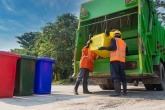Dark Green Group to develop 12 urban anaerobic digestion plants
Plans for up to 12 new AD facilities will convert food waste into enough green gas to power 80,000 homes annually.
 Renewable energy developer, Dark Green Group, has announced plans to establish up to 12 anaerobic digestion (AD) plants across the UK, aiming to process over 700,000 tonnes of organic waste annually.
Renewable energy developer, Dark Green Group, has announced plans to establish up to 12 anaerobic digestion (AD) plants across the UK, aiming to process over 700,000 tonnes of organic waste annually.
The first phase of the project includes developments at Birmingham’s Tyseley Energy Park and manufacturing campuses in Yorkshire.
These facilities will not only aim to generate enough green gas to power up to 80,000 homes, but will also incorporate heat, power, and hydrogen production capabilities.
Anaerobic digestion converts food waste into gas, and offers an alternative to landfill and Energy from Waste incineration, following the Department for Environmental, Food and Rural Affairs (Defra)’s recent cap on new waste incinerator approvals.
Although AD plants are typically based in agricultural areas in the UK, Dark Green Group is following models used in Europe, such as in Frankfurt and Groningen, that are located in urban areas. Waste handling areas will be enclosed, with plans to ensure that odours and bioaerosols will be captured instead of affecting neighbouring communities.
Charlie Clay, Chief Executive of Dark Green Group, commented on the advantages of the AD plants: “Modern, urban anaerobic digestion can be a lynchpin in the energy transition as it offers a multitude of benefits for homes and businesses. From the processing of organic waste, we will produce clean, green and secure energy supplied directly to industry and business locally, and for household use.”
Whilst renewable energy has made significant progress in the UK, green gas (biomethane) currently constitutes less than 1 per cent of the nation’s gas consumption. Recent research from BMA and ADBA has suggested that green gas could reduce UK spending by £298 billion.
These plans come as new food waste regulations under Simpler Recycling are set to come into effect in March 2025, which will require all non-household municipal premises in England to separate food waste from other waste streams.
A spokesperson for Dark Green Group highlighted the benefits for councils ahead of these legislative changes: “With the changes in food waste regulations, Dark Green Group’s urban AD will provide councils with a local facility to process food waste, will save local authorities £millions in transport and processing costs and at the same time provide carbon emission savings from reduced transport miles.”







